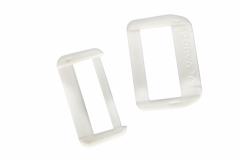 The German sports equipment manufacturer Vaude is using the biobased polyamides of Evonik’s Vestamid Terra brand in its new collection of bags and backpacks.
The German sports equipment manufacturer Vaude is using the biobased polyamides of Evonik’s Vestamid Terra brand in its new collection of bags and backpacks.
Evonik is responding to the continuing demand for greater sustainability in the sports industry with innovative plastics solutions. The combination of environmental benefits and exceptional material properties has made the company’s bio-based polyamide Vestamid Terra a preferred material for Vaude’s sports equipment.
The family-owned company from southern Germany relied on the bio-based synthetic material by Evonik for developing the buckles of its new bag and backpack collection.
Vestamid Terra (PA 610) offers excellent impact resistance in cold temperatures. That makes the material ideally suited for all-weather buckles and other durable elements in equipment for demanding mountaineering and other leisure activities. Thanks to their low water absorption, buckles made of PA 610 are less likely to become brittle when used in the sports equipment of Vaude. This reduces the risk of tearing and improves product safety. Moreover, the low density of Vestamid Terra allows for manufacturing lighter sports equipment with a natural feel.
“Our products reflect our deep commitment to people and nature. We are always searching for innovative materials that help us meet these self-imposed obligations. The bio-based plastics of Evonik open up new opportunities to manufacture our products with even greater sustainability,” says René Bethmann, innovation manager at Vaude.
Vaude plans to expand the successful use of VestamidTerra to other product ranges in the future. For example, textile fibers made from Evonik’s biopolyamides are lightweight, stretchable and breathable. The fabrics stand out for low moisture absorption, they dry quickly and don’t need ironing. The unique innovative high-performance fibers can be processed in all textile applications.
Vestamid Terra is made up to 100 percent from the seeds of the castor bean plant, but its sustainability concept goes beyond environmental benefits. Since castor bean plants can survive prolonged drought, they are typically cultivated in arid regions with no other agricultural use. As a result, the high-performance polymer does not have a negative impact on the human food chain.
Visit Hall 6, B28 at the K Show in Düsseldorf from October 16-23 for more information.
Source
Bioplastics MAGAZINE, 2019-09-23.
Supplier
Share
Renewable Carbon News – Daily Newsletter
Subscribe to our daily email newsletter – the world's leading newsletter on renewable materials and chemicals










